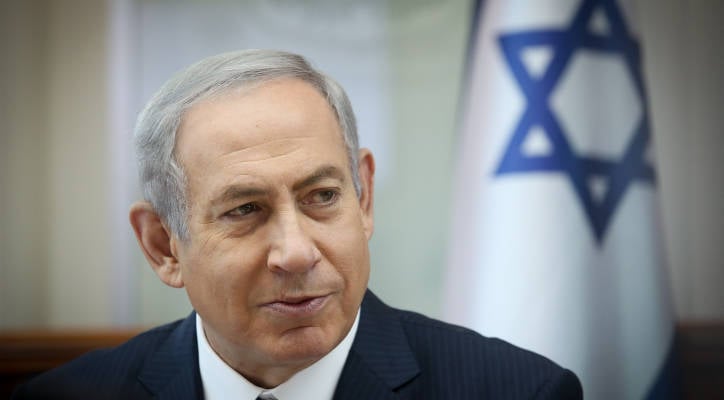Israel will discuss the growing Iranian threat on its northern border in the upcoming meeting between Prime Minister Benjamin Netanyahu and Russian President Vladimir Putin in Moscow.
Prime Minister Benjamin Netanyahu warned Iran is working to establish a permanent military presence in Syria, particularly facing Israel in the Golan Heights, on its northern border.
Speaking Sunday at the weekly cabinet meeting, Netanyahu said he will meet with Russian President Valdimir Putin in Moscow on Thursday, and discuss Syria and the need to formulate an agreement to prevent friction.
Russia has been facilitating peace talks between the Assad regime and the various warring factions in Syria in an attempt to resolve the Syrian civil war.
“In the context of this agreement, or without it, Iran is trying to establish itself permanently in Syria, with a military presence on the ground and at sea, and also a gradual attempt to open a front against us on the Golan Heights,” Netanyahu warned. “I will express to President Putin Israel’s sharp and vigorous opposition to this possibility,” he stated.
Russia is a key player in Syria, has ties with Iran and can curb its mounting military might in the war-torn country.
“I hope we will be able to reach certain understandings in order to reduce possible friction between our forces and theirs, as we have successfully done up until now,” he concluded.
Netanyahu has spoken to the Russian premier on the phone several times in recent months and the two leaders have met on four separate occasions over the past year.
Despite Russia’s ties with Iran and Syria, as well as its tensions with the West over the war in Ukraine, Israel maintains a warm relationship with Moscow.
Jerusalem and Moscow have established a line of communication to prevent possible clashes between Israeli and Russian air forces in Syria.
Hezbollah and Iranian military forces have attempted to establish a base in the Golan, from which they intended to launch another military front against Israel. According to foreign reports, Israel has conducted several strikes to prevent such a hostile build-up on its borders.
In January 2015, Israel’s Air Force (IAF) reportedly attacked a convoy carrying Hezbollah terrorists and an Iranian general.
The Shiite axis led by Iran in Syria is one of the most important strategic issues facing Israel. Syria’s battlegrounds have created a strong imbalance in the region to Iran’s benefit, which has utilized the chaos to broaden its regional influence.
For Israel, the most important issue is ensuring Iran and its proxies cannot establish a base in Syria from which to attack Israel.
“If Iran and Hezbollah manage to base themselves in Syria, it would be a permanent source of instability in the entire region,” Hagai Tzuriel, director-general of the Intelligence Ministry who served for 28 years in the Mossad, told the Times of Israel last week, referring specifically to the threat of an Iranian naval base on the Mediterranean.
By: Max Gelber, United with Israel
